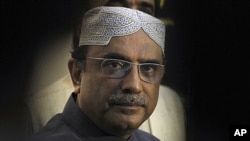Pakistan President Asif Ali Zardari will meet with Indian Prime Minister Manmohan Singh on April 8 in the first visit to India by a Pakistani head of state since 2005. Along with growing economic ties, the trip could be a sign of improving relations between the nuclear-armed rivals.
President Zardari's itinerary
During President Zardari's one-day visit to India Sunday, he will have lunch with Prime Minister Singh in New Delhi, then travel south to visit a Sufi shrine in the city of Ajmer.
There is no concrete agenda for the meeting but political analyst Hasan Askari Rizvi says he expects a positive first meeting between the two leaders. “They will not be under pressure to produce results because it is an informal meeting," he said. "However this will enable them to talk about the ongoing process of normalizing the relationship.”
This will be President Zardari's first visit to India since he took office in 2008. The last Pakistani president to visit India was General Pervez Musharraf, who came on an official visit in 2005.
Pakistani-Indian relations
- February 2012: Pakistan pledges to phase out restrictions and tariffs on many Indian imports by the end of the year.
- January 2012: India, Pakistan are closer to a deal on a pipeline that would transport natural gas from Turkmenistan through Afghanistan.
- December 2011: Both countries call for extending agreement on reducing the risk of nuclear accidents relating to their atomic stockpiles.
- November 2011: Pakistan's cabinet approves a proposal granting India "most favored nation" trade status.
- October 2011: India supports Pakistan's bid to become a non- permanent member of the U.N. Security Council.
- February 2011: Peace talks resume. Talks were suspended after the 2008 Mumbai terrorist attack, which India blamed on Pakistani-based militants. Islamabad denied any role in the incident.
The nuclear armed neighbors have had a tense and troubled relationship since the two nations gained independence from Britain in 1947, and have fought three wars over the disputed region of Kashmir.
Improving ties, building trust
A peace process that began in 2004 was derailed in 2008 when 10 militants laid siege to the Indian city of Mumbai, killing 166 people. India blamed the attack on Pakistan-based militant group Lashkar-e-Taiba.
While political reconciliation efforts have stalled, Pakistan and India have been improving economic ties.
In November, Pakistan's Cabinet approved a proposal granting India “Most Favored Nation” trade status. The designation removes tariffs and allows the countries to trade on equal terms. Annual trade between the neighbors is estimated at some $2 billion. Economists say that once all the barriers are lifted, cross-border trade could grow to more than $6 billion.
Rizvi, a former professor of Pakistan studies at Columbia University, says increased trade could lead the way to cooperation on other issues. “It appears at this stage that they are gradually moving in that direction, increased trade. And that is likely to generate goodwill. And that might help to ease tension," said Rizvi. "And enable them to deal with less contentious issues.”
He says the countries will need to build up a great deal of trust over time before any progress can be made to solve complex, divisive issues, like the dispute over the Himalayan region of Kashmir and the increasing tension over India's plans to build dams on rivers that flow into Pakistan.
The United States has also been encouraging dialogue between India and Pakistan to promote regional stability ahead of the withdrawal of NATO-led forces in Afghanistan.




